Probation Service 'deeply regrets' failings that led to convicted killer murdering property developer
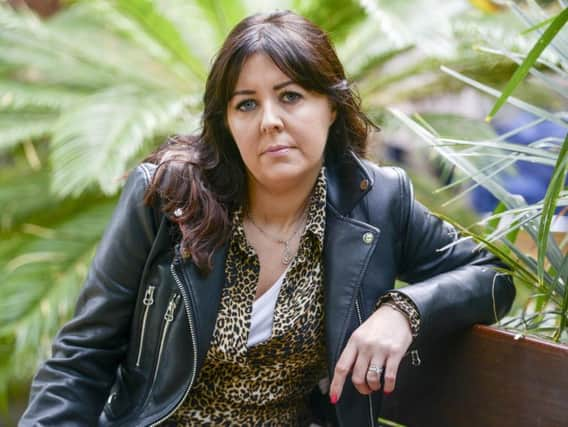

Nicola Gogarty has a photograph of herself taken ten minutes before she found out her father had been murdered as she sat in an airport about to board a flight for a weekend away with friends.
“I no longer recognise that person,” she says of the picture which happened just before she received the devastating phone call that would begin a four-year nightmare. “She looks so happy and carefree. I don’t feel I will ever be that person again.”
Advertisement
Hide AdAdvertisement
Hide AdNicola and her husband Wayne have met with The Yorkshire Post in a coffee shop in Sheffield the day after a coroner laid out the missed opportunities by the authorities that could have prevented the death of her father John, who was stabbed 69 times in an unprovoked attack in his own home in Wombwell, South Yorkshire on July 13, 2015. His body was discovered several days later by Nicola’s brother, who is also called John.
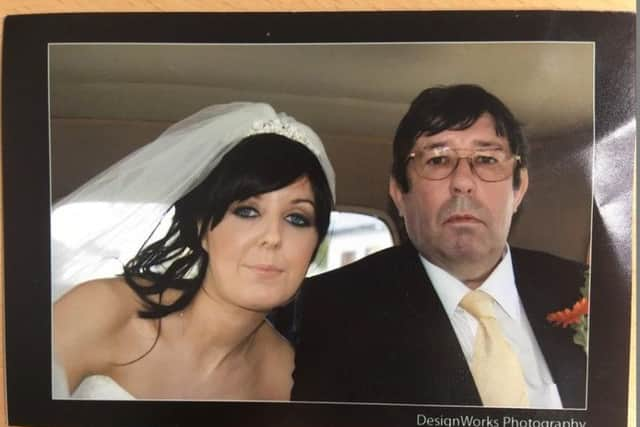

“My brother was in a state of shock,” she recalls. “He said his shirt looks like a cheese-grater and there is blood everywhere. I wasn't thinking clearly and said, ‘Did he have a heart attack?’ He said, ‘No, it looks sinister’.”
Nicola says it was the “most horrendous day of my life” as she came to terms with losing her father, who she says was a quiet man but with “a great sense of humour and a very dry wit” who had instilled the values of hard work in his three children after a career involving being a television engineer then running his own shop and B&B before moving into property development.
Police quickly established the 65-year-old grandfather, who was originally from Ireland but had lived in Yorkshire for almost 30 years, had answered the door to a man and a woman before being attacked and forced to hand over his bank card and PIN details. The woman had gone to a nearby cashpoint to withdraw £500 from his account before returning to the house, where Mr Gogarty was stabbed to death by the man.
Shock revelation
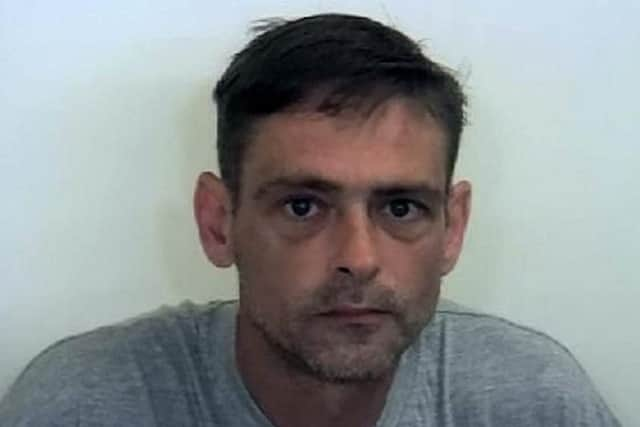

Advertisement
Hide AdAdvertisement
Hide AdNicola and Wayne had flown immediately from Ireland over to the UK following the news of her father’s death but after nine days in Yorkshire had just returned home back to County Dublin when she was called by police to say two people had been charged – and was then given another devastating piece of information.
The man involved was Ian Birley, an already-convicted killer who had been let out on licence 19 months previously from his life sentence for a similarly-unprovoked murder of a pensioner called Maurice Hoyle in 1995. Birley had bludgeoned Mr Hoyle, a retired brewery clerk, with a whisky bottle before repeatedly stamping on the 69-year-old’s head. Mr Hoyle, who was also attacked in his own home by Birley at a property just four miles from where the attack on Mr Gogarty would occur 20 years later, died as a result of his dentures breaking and a piece becoming lodged in his windpipe.
Nicola says: “My first question was: why was this man walking the streets if he had done such a horrific crime in 1995?”
Birley and his girlfriend Helen Nichols were both convicted of murder in December 2015 after the trial revealed how Birley decided to rob Mr Gogarty as he was under pressure to repay a £500 drug debt he owed for crack cocaine that he had purchased with the intention of selling on but had instead consumed himself. A former girlfriend of Birley’s had been Mr Gogarty’s cleaner – resulting in him knowing where his victim lived and leading to the robbery plot.
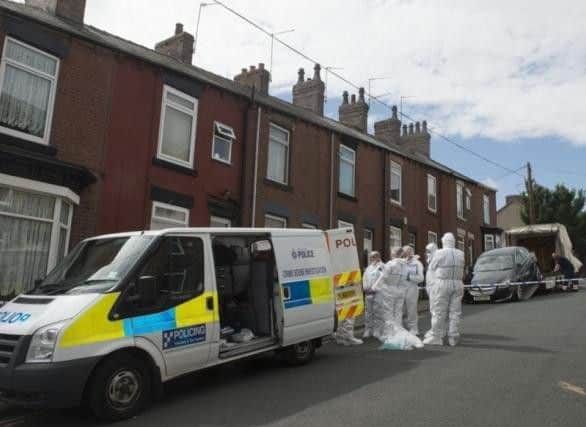

Advertisement
Hide AdAdvertisement
Hide AdThe trial detailed how Birley and Nichols had even stolen champagne from Mr Gogarty’s house as he lay dying in his front room and had subsequently drunk it back at their flat following the killing.
But the family’s ordeal did not come to an end as they continued to seek answers about how and why Birley had been allowed back into the community to kill again – issues that were not the subject of the trial and the jury was not even told about until after the verdict after the judge ruled letting them know could prejudice the case against him.
Anger at internal report
Nicola, along with Wayne and her brother John and sister Phoebe, attended a meeting with the Probation Service in April 2016 where she says they were shown a brief internal report she felt minimised the organisation’s failings after it was revealed Birley had been repeatedly breaching the terms of his licence by drinking and taking drugs.
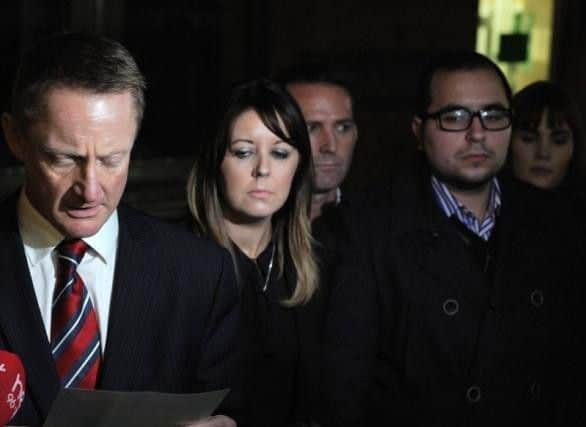

“They said they didn’t take ‘appropriate steps’. I felt they were trying to dress it up. When I read that, I said this is not right.”
Advertisement
Hide AdAdvertisement
Hide AdShe says the family were told they were not allowed to keep a copy of the report.
With the help of the Victim Support charity, the family contacted a legal firm called Slater and Gordon to push for an inquest into their father’s death to be ordered. Holding such a hearing after a Crown Court murder trial has taken place is such a rare occurrence that South Yorkshire coroner Christopher Dorries said it was only the second time in more than 27 years he had done so - a process that was started by Nicola writing to him to set out why she believed one was necessary.
Failings made public
The inquest finally took place last month, with Mr Dorries revealing his narrative conclusion last Friday which highlighted the missed opportunities by the Probation Service to prevent Mr Gogarty’s death.
Birley had been released on licence on December 9, 2013 after being classified as a 'medium risk' offender. The Parole Board's decision to release him did not fall within the scope of the inquest.
Advertisement
Hide AdAdvertisement
Hide AdOne of the conditions of Birley being released was a requirement for him not to drink alcohol. But on January 3, 2014, he tested positive for alcohol and was given a “final warning”. He tested positive for alcohol again on March 11 but was not subject to a further warning or recalled. In May 2014, he twice tested positive for methadone and was given a second “final warning”.
Mr Dorries said this gave Birley the impression he could “play the system”, with no consequences for breaching his licence. He said while returning Birley to jail “would not have been an absolutely guarantee against the harm that eventually befell Mr Gogarty” as he may have targeted him at a later date, “I consider it plain at least that Mr Gogarty would not have died when he did if [Birley] had been recalled to prison in May 2014.”
In November 2014, Birley was allowed to leave a supervised hostel and was no longer drug tested as there was no provision for in-house testing when an offender reported for a probation interview - a situation the Probation Service says has now changed.
In the months before Mr Gogarty’s murder, Birley was not keeping to his regular weekly probation appointments but staff claimed “he looked well and did not give the appearance of taking drugs”.
Advertisement
Hide AdAdvertisement
Hide AdHowever, police subsequently found during their murder investigation that from April 2015, Birley had been taking crack cocaine and potentially heroin. One witness described him as “‘on edge, nervous, and unpredictable’, carrying a Stanley knife”.
Overstretched service
Mr Dorries said he would be writing to the Probation Service with a Prevention of Future Deaths report to highlight where he felt opportunities had been missed.
The coroner also highlighted wider concerns about the service, following its much-criticised part-privatisation ordered by then Justice Secretary Chris Grayling which resulted in a “sudden and dramatic increase in workload” from June 2014.
Mr Dorries said there was “no direct evidence” that the reorganisation had affected this case but added it was “far from comforting” to hear evidence from one worker “that she still had probably not got the resources to do her job properly”.
Advertisement
Hide AdAdvertisement
Hide AdThe coroner’s concerns follow a recent National Audit Office report, which found there is a shortfall of probation officers, with more than one in ten positions unoccupied.
Alarmingly, hundreds of supervised offenders have gone on to commit serious violence and sexual offences while back out in the community – 627 were charged with such an offence in 2017/18 alone, a 24 per cent increase on the year before. Following their experiences, the Gogarty family is now pushing for independent investigations to be launched as a matter of course in such cases rather than there just being internal reviews.
Call for change
Nicola says while the inquest process has vindicated the family’s concerns, she struggles to comprehend why the family had to fight so hard to “truly understand how a loving pensioner was let down so catastrophically by the justice system”.
She says: "Everyone involved is still in a job. I did it for our family but also for future people who might have to go through this horrific process. You shouldn’t have to fight for an inquest to be done on something like this. I was happy with the inquest outcome but it was bittersweet. I was really upset because really, my dad should still be here.
Advertisement
Hide AdAdvertisement
Hide Ad"Given they were dealing with such a violent man, I really don’t think they took their job seriously enough. Our family is going to suffer from that for the rest of our lives.”
Ongoing impact of murder
Nicola, who has three children and works as a hairdresser, says the impact of the case on her family is difficult to put into words.
“The last four years have been horrendous. There are just days when you want to go back to your old life but obviously you can’t, you are a different person. The experience turns your world upside down, it really affects your mental health.
“I haven’t really worked because my job obviously involves being very talkative and I just wasn’t physically or mental able to talk to people. I have avoided social occasions, it is really difficult.
Advertisement
Hide AdAdvertisement
Hide Ad“They say you reach some sort of acceptance with grief and I haven’t reached that point yet. They say you need to reach that point to heal yourself but I’m still very, very angry.”
Her two younger children do not know the details of their grandfather’s violent death and Nicola says they still ask after their ‘grandad in the sky’, with one of them recently wanting him to come to a grandparents’ day at their school, meaning she had to explain why that wouldn’t be possible. “He loved the kids and spoiled them rotten,” she says. “They were the apple of his eye.”
Findings 'must be heeded'
Kim Harrison, the family’s lawyer at Slater and Gordon, says: “We hope that the failings highlighted in this case will not be ignored.
“It was my client’s determination to get to the truth that led to this inquest being resumed and we thank the coroner for looking into matters so thoroughly.
Advertisement
Hide AdAdvertisement
Hide Ad“In particular we note his formal finding that the events of May 2014, when Birley repeatedly breached his licence conditions, as a whole amounted to a missed opportunity to take action which would, more likely than not, have safeguarded her father, from an attack the following year.
“We agree with the coroner that the lack of provision for drug testing in the community at that time, was a major omission, leaving Birley reduced scrutiny. This lack of any adequate system in place to provide effective monitoring was, on the balance of probabilities, a more than minimal contribution to the circumstances of Mr Gogarty’s death.
“The family are concerned that after the death of their father, there was only an internal NPS review into any acts or omissions that could have contributed to his death and without this inquest there would not have been an independent investigation into any of those issues.
“On behalf of the family we are now calling for an automatic independent investigation to take place whenever a murder is committed by somebody under supervision of the probation service.”
Probation Service's 'deep regrets'
Advertisement
Hide AdAdvertisement
Hide AdThe Probation Service says it “deeply regrets” any failings which may have led to Mr Gogarty’s death and has taken steps to prevent another similar tragedy.
A National Probation Service spokesperson said: “Our thoughts and sympathies are with Mr Gogarty’s loved ones, and we deeply regret any failings that may have contributed to his death.
"We have taken a number of steps to try and correct issues that have been identified following Mr Gogarty’s tragic death, by the coroner and by our own Serious Further Offence Review.
"We will listen to the Coroner’s recommendations on what more can be done.”
Advertisement
Hide AdAdvertisement
Hide AdA new system of drug testing of supervised offenders are among the measures introduced since the murder, while prisoners released from life sentences back into the community are now subject to increased supervision processes.
Speaking out
After keeping a public silence for the past four years due to not wanting to potentially jeopardise the Crown Court trial and the inquest process, Nicola has now begun speaking to the media and is participating in a Channel 5 documentary about her father’s death.
“I want to highlight the failings and what a family goes through on a day-to-day basis after a murder. Nobody sees how your life is changed. But I also wanted to highlight how we have let down by the system. My dad should still be here.”